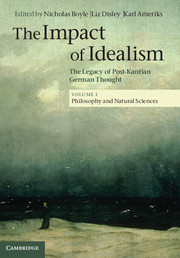Book contents
- Frontmatter
- Contents
- List of Illustrations
- List of Contributors
- Acknowledgements
- List of Abbreviations
- Foreword
- General introduction: the eighteenth and nineteenth centuries
- General introduction: the twentieth and twenty-first centuries
- Introduction: Idealism in the natural sciences and philosophy
- 1 Philosophy of natural science in Idealism and neo-Kantianism
- 2 The impact of German Idealism and Romanticism on biology in the nineteenth century
- 3 The unconscious: transcendental origins, Idealist metaphysics and psychoanalytic metapsychology
- 4 Nietzsche, Kant and teleology
- 5 Transcendental idealism, phenomenology and the metaphysics of intentionality
- 6 Heidegger and the impact of idealism
- 7 French Hegelianism and anti-Hegelianism in the 1960s: Hyppolite, Foucault and Deleuze
- 8 Scottish Idealism
- 9 ‘My station and its duties’: social-role accounts of obligation in Green and Bradley
- 10 Idealism and the origins of analytic philosophy1
- 11 Idealism and Pragmatism: the inheritance of Hegel's concept of experience
- 12 Reason's form
- Bibliography
- Index
- References
3 - The unconscious: transcendental origins, Idealist metaphysics and psychoanalytic metapsychology
Published online by Cambridge University Press: 05 December 2013
- Frontmatter
- Contents
- List of Illustrations
- List of Contributors
- Acknowledgements
- List of Abbreviations
- Foreword
- General introduction: the eighteenth and nineteenth centuries
- General introduction: the twentieth and twenty-first centuries
- Introduction: Idealism in the natural sciences and philosophy
- 1 Philosophy of natural science in Idealism and neo-Kantianism
- 2 The impact of German Idealism and Romanticism on biology in the nineteenth century
- 3 The unconscious: transcendental origins, Idealist metaphysics and psychoanalytic metapsychology
- 4 Nietzsche, Kant and teleology
- 5 Transcendental idealism, phenomenology and the metaphysics of intentionality
- 6 Heidegger and the impact of idealism
- 7 French Hegelianism and anti-Hegelianism in the 1960s: Hyppolite, Foucault and Deleuze
- 8 Scottish Idealism
- 9 ‘My station and its duties’: social-role accounts of obligation in Green and Bradley
- 10 Idealism and the origins of analytic philosophy1
- 11 Idealism and Pragmatism: the inheritance of Hegel's concept of experience
- 12 Reason's form
- Bibliography
- Index
- References
Summary
The psychoanalytic conception of the unconscious, over a century after its insertion into the epicentre of late modern intellectual life, continues to cast a spell and stir controversy; even those unpersuaded of the truth of psychoanalytic claims, or sceptical of its therapeutic value, recognise in the idea of the unconscious expounded by Freud a fascinating conceptual object.
The historical origins of psychoanalysis have been investigated intensively. The picture which emerges from the major studies is of a huge diversity of confluent historical sources, inclusive of philosophers in the Idealist tradition – Schelling, Romantic Naturphilosophen, Schopenhauer, Gustav Carus, Eduard von Hartmann – but also numerous figures outside it, such as Hermann von Helmholtz and others in nineteenth-century experimental psychology, along with a great number of natural and human scientists from other disciplines. It is notable, moreover, that if we restrict our attention to the more local, biographical influences on Freud, then the latter camp predominates overwhelmingly: those who taught Freud or with whom he had professional associations in the early part of his career – Ernst Brücke, Josef Breuer, Theodor Meynert, Jean-Martin Charcot, Wilhelm Fliess – were, like Freud, trained physicians whose conception of organic functioning had been thoroughly purged of vitalism and other Romantic and Idealistic elements. Brentano, who provided Freud with direct exposure to philosophy, stood opposed to the Idealist orientation. To the extent that we concentrate on Freud's proximate intellectual background, we will thus be led to regard psychoanalysis as a late, albeit somewhat exceptional, development within the nineteenth-century German psychological tradition, exhibiting certain affinities with Romantic Idealism but fundamentally disjoined from classical German philosophy. Patricia Kitcher has made a detailed historical case in support of such a view.
- Type
- Chapter
- Information
- The Impact of IdealismThe Legacy of Post-Kantian German Thought, pp. 134 - 165Publisher: Cambridge University PressPrint publication year: 2013
References
- 1
- Cited by

